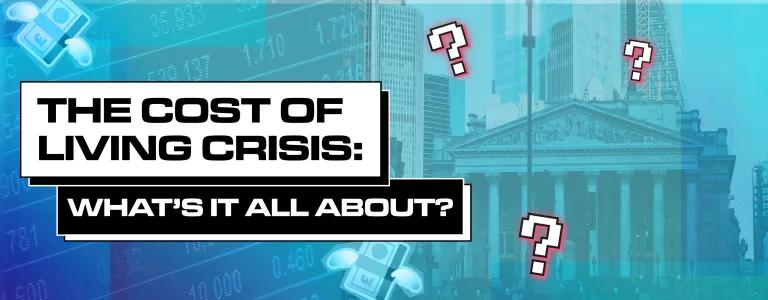
The Cost Of Living Crisis: What’s It All About?
Include this article in your Skills Builder Journal. It could help you develop... 

You may have seen on the news in the last few months lots of talk about ‘the cost of living’, inflation, and some general (but very real) worries for the future. And we don’t want to sugar coat things, for a lot of people it’s quite a scary time. Prices are going up, but salaries are staying the same, so many people are anxious about how they will be able to continue living the way they do.
And although this is all over the news at the moment, it can still feel quite confusing. You might be worried about what this means for you and your family, so we’ve put together a guide to break down what’s going on and what it all means…
What does Cost Of Living actually mean?
Cost of living means just that; the cost of being able to live. So this means the money spent on things like food, household bills, petrol, mortgages or rent, taxes, and healthcare.
A recent study from Forbes shows that 91% of adults have seen an increase in their living costs in the last year, with 73% saying that costs have become more expensive in the last month alone.
Why has it risen so much?
The Cost of Living crisis that we’re currently seeing doesn’t have one definitive starting reason, there are a number of different factors adding to the increase of cost.
The COVID-19 pandemic obviously affected the world when it came to health, but it also affected social and economic factors too. So many businesses and industries saw losses that they’re still trying to recover from now. As it was a global pandemic, it meant that global supply chains also suffered as different countries had lockdowns at different times, so supply and demand was always very fragile. Farming, agriculture and raw materials were all affected by this, and even lorry drivers and distributors were hit - where it used to cost £3,000 to ship a container from Asia to the UK, it now costs £15,000.
The conflict between Russia and Ukraine caused a further supply shock, which caused a huge surge in oil, gas, energy and food prices. The price of oil tends to typically surge at the beginning of wars, as countries seek to buy more. However, because of Russian sanctions, supply was - and continues to be - restricted, which isn’t helped by the fact that Russia is a key international gas supplier.
Climate change and unusually cold winters across the globe in 2020 and 2021 meant that the demand for energy continued to skyrocket, which had an impact on supply, and therefore, prices. In the UK, the majority of electricity is produced by burning fossil fuels. The recent rise of the green agenda (the movement towards renewable energy) has a positive outlook and is hopeful for the future, however, right now, renewables aren’t able to provide sufficient power, so there is a continued reliance on gas, and therefore a continued demand on supply/price.
These things, plus many others have meant a huge increase on the things we need every day to be able to live comfortably.
What exactly will be affected for the individual?
One of the biggest conversations that is currently in the news is the cost of energy bills. As it starts to get colder again this winter, energy bills are predicted to rise yet again. Climate change and the lack of gas storage facilities continue to be affected by what’s happening in Russia and Ukraine.
For car and vehicle owners, the cost of petrol has also been steadily increasing. According to the Office for National Statistics (ONS), petrol is the third most common reason for seeing a tighter budget.
Climate change, distribution issues and driver shortages have all affected the price of food shopping, which is where 95% of families are really starting to notice a change in budget. ONS figures show that in August 2021, a pint of milk cost 41p. A pint in August 2022 now costs 62p. And it’s not just grocery shopping. Fast food businesses are also increasing their prices - in July, the cost of a McDonald’s cheeseburger, which had remained fixed at 99p for the last 14 years, went up to £1.19p.
Streaming services are also changing. Services like Netflix have increased their costs from from £9.99 to £10.99 a month, with its premium package from £13.99 to £15.99 a month.
These are just a few of the things that are increasing. For a more detailed look at all of the increases, take a look at this article.
So what plans are in place to help?
It’s fair to see why some people are getting more and more anxious about the cost of living, with essential needs creeping up and up. But there are some plans in place that aim to give individuals help and help put some anxiety at rest.
The Government has put a cost of living payment scheme into place for eight million households around the country. Households that qualify (those on Universal Credit, Jobseeker’s Allowance, Employment and Support Allowance, Income Support, Pension Credit, Child Tax Credit or Working tax Credit) will receive a £650 payment over the next year, in two instalments to go towards paying bills.
Households in council tax bands A to D will receive a £150 council tax rebate in 2022/23 which will not need to be repaid.
The Government also announced the Energy Bills Support Scheme and Energy Price Guarantee, which will run until April 2023, where energy suppliers will apply discounts to households they supply electricity to and there will be a limit on the price suppliers can charge for energy.
How are young people feeling about it all?
We asked members of our Writers Club and reached out on our Insta to ask you how you’re feeling about all of this. Here’s what you had to say:
“I feel like it seems beyond reach for a young person to actually rent a place on their own in the future.”
“I worry about the cost of living crisis, particularly because I’m not sure my parents would tell me whether it’s actually going to impact us or not. When I hear about it on the news it just feels like another thing to add to the pile of generally awful things happening in the world right now. And I don’t feel like people in power are going to do anything to help…”
“I am super grateful that we can afford things but I feel awful for people who can’t…”
“I don’t think it really affects me personally, as I live with my parents. But seeing how much harder they are having to work because of it is definitely a struggle. From what I’ve seen, a lot of Europe has the exact same problem, which is kind of reassuring because we’re not alone in this problem, but also terrible because so many other people also have to deal with it.”
“It’s stressing me out because it could end up affecting me and my future”
“It’s made me realise how thankful we need to be for the little things like friends and family…”
Are there any changes young people can make?
It might feel like everything is out of your control right now, and that’s a totally normal thing to feel! It’s not like you can change the cost of food or petrol, or just pop over to Russia and put an end to everything. But, there are some small changes you can make within your house to help reduce the amount, and cost, of energy that is used every day.
Little things like making sure you turn off lights when you leave a room, and turning the tap off whilst you’re brushing your teeth. These things might seem tiny, but will all add up in the grand scheme of things!
You don’t have to stop using Netflix, or playing video games, but shutting down your consoles and turning off your TVs properly will also save energy. This also goes for other electrical items too. Some use energy even when they aren’t on, so by turning the plug off, or taking the plug out, it’ll stop that flow.
Check out our blog on making energy savings for some more information. And find out what offers are available from businesses to help you and your family here.




